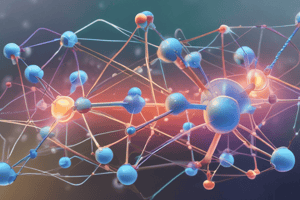Podcast
Questions and Answers
What is the smallest unit of matter that can exist independently?
What is the smallest unit of matter that can exist independently?
- Neutrons
- Molecules
- Compounds
- Atoms (correct)
Which of the following is a pure substance composed only of one type of atom?
Which of the following is a pure substance composed only of one type of atom?
- Molecules
- Elements (correct)
- Compounds
- Ions
What results from two or more different elements bonding chemically together in fixed ratios?
What results from two or more different elements bonding chemically together in fixed ratios?
- Compounds (correct)
- Elements
- Isotopes
- Mixtures
What is the indispensable tool for organizing chemical information?
What is the indispensable tool for organizing chemical information?
Which subatomic particle is NOT found in the nucleus of an atom?
Which subatomic particle is NOT found in the nucleus of an atom?
In water, how many hydrogen atoms are covalently bound to one oxygen atom?
In water, how many hydrogen atoms are covalently bound to one oxygen atom?
What is a chemical reaction?
What is a chemical reaction?
How does the Periodic Table organize elements?
How does the Periodic Table organize elements?
What do single displacement reactions involve?
What do single displacement reactions involve?
Why is knowledge of chemical reactions important?
Why is knowledge of chemical reactions important?
How do scientists use the Periodic Table for studying chemical reactions?
How do scientists use the Periodic Table for studying chemical reactions?
In which category do combustion reactions fall?
In which category do combustion reactions fall?
Study Notes
Exploring Basic Chemistry: Atoms, Elements, Compounds, Reactions, and the Periodic Table
Chemistry is a fascinating field where we study matter and its transformations through various processes. Let's dive into some fundamental aspects of this discipline by examining atoms, elements, compounds, chemical reactions, and the indispensable tool for organizing chemical information—the Periodic Table.
Atoms
Atoms are the smallest units of matter that can exist independently, each consisting of a nucleus containing protons and neutrons surrounded by electrons. They come together to form molecules and make up every substance around us.
Elements
An element is a pure substance composed only of one type of atom; there are approximately 118 known elements, ranging from hydrogen with just one proton to heavy metals like uranium with hundreds. Some common examples include carbon, oxygen, nitrogen, calcium, iron, gold, and hydrogen itself. These elements combine to create countless compounds found throughout nature and industry.
Compounds
Compounds result when two or more different elements bond chemically together in fixed ratios, forming new materials with unique properties. For example, water consists of one oxygen atom covalently bound to two hydrogen atoms, while salt contains sodium and chlorine atoms paired off in equal numbers. Familiarity with these combinations is essential for understanding the world around you, whether it's cooking dinner or designing life-changing technologies.
Chemical Reactions
A chemical reaction occurs when atoms rearrange themselves to form new products. This process usually involves breaking existing bonds between atoms and forming new ones. Common types of chemical reactions include synthesis, decomposition, single displacement reactions, double displacement reactions, redox reactions, and combustion reactions. Each has specific characteristics and applications across various fields. Understanding these reactions helps predict how substances will interact under certain conditions.
The Periodic Table
Designed to organize and classify elements based on their atomic structure and properties, the Periodic Table serves as our go-to guide for learning chemistry. It arranges all known elements in rows and columns according to increasing atomic number, grouping them together based on shared electron configurations and properties. As such, it provides valuable insights into the behavior of each element and allows scientists to recognize patterns and trends among them. In addition, the Periodic Table makes studying chemical reactions much easier because similar elements often react similarly due to their shared positions within the table, facilitating predictions and experiments alike.
Knowledge of these basic concepts serves as the foundation upon which advanced studies and practical applications of chemistry unfold, enabling us to answer vital questions about the natural world and solve complex problems facing society today. So, embrace your inner scientist and delve deeper into the beauty and elegance inherent in basic chemistry!
Studying That Suits You
Use AI to generate personalized quizzes and flashcards to suit your learning preferences.
Description
Test your knowledge of atoms, elements, compounds, chemical reactions, and the Periodic Table with this quiz. Explore the fundamental principles that underpin the field of chemistry and discover how these concepts shape the world around us.




